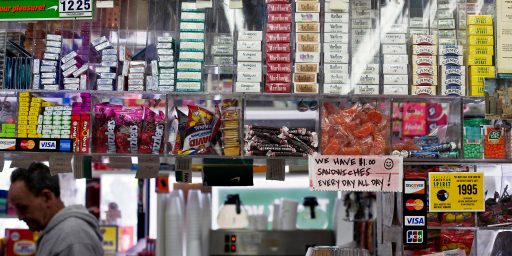Tennessee Cigarette Police State
Tennessee revenuers are waiting at the borders to arrest people with cigarettes.
Starting [Thursday], state Department of Revenue agents will begin stopping Tennessee motorists spotted buying large quantities of cigarettes in border states, then charging them with a crime and, in some cases, seizing their cars.
Critics say the new “cigarette surveillance program” amounts to the use of “police state” tactics and wrongfully interferes with interstate commerce. But state Revenue Commissioner Reagan Farr says his department is simply doing its job, enforcing a valid state law while protecting Tennessee retailers who properly pay state taxes.
Agents have already been watching out-of-state stores that sell cigarettes near the Tennessee border to “get a feel where problem areas are,” Farr said. While declining to be specific, the commissioner said “problem areas” are generally along interstate highways with exits near the Tennessee border.
The idea is for the monitoring agent to spot a person buying cigarettes in volume at an out-of-state market, then departing in a vehicle with Tennessee license tags. Starting today, monitoring agents spotting such a suspect will call an arresting agent who will stop the car when it enters Tennessee, he said.
[…]
Tennessee’s cigarette tax went from 20 cents per pack to 62 cents per pack effective July 1. All eight states that border Tennessee have lower tax rates, meaning smokers can save up to 45 cents per pack — $4.50 for a 10-pack carton — by purchasing out of state. The border states with the lowest cigarette taxes are Missouri with 17 cents and Mississippi at 18 cents. The highest is Arkansas with 59 cents. Kentucky and Virginia both tax cigarettes at 30 cents a pack, North Carolina at 35 cents, Georgia at 37 cents and Alabama at 42.5 cents.
Under state law, bringing more than two cartons of cigarettes into the state without paying Tennessee taxes is a “Class B” misdemeanor, carrying punishment of up to six months in jail and/or a $500 fine. Bringing 25 or more cartons is a “Class E” felony, with minimum penalty of one year in prison and a maximum of six years plus a fine of up to $3,000. In addition, the specific state statute dealing with untaxed cigarettes provides that vehicles used to transport more than two cartons “are considered contraband and are subject to seizure,” says a Department of Revenue statement.
Farr said that agents have been instructed to seize any vehicle carrying more than 25 cartons of cigarettes without Tennessee tax stamps. In cases where three to 24 cartons are involved, he said vehicle seizure is “at the officer’s discretion.”
How this can possibly be constitutional is beyond me. First, what gives Tennessee police officers the authority to operate across state lines? Second, surely seizing a vehicle potentially worth upwards of $40,000 for the “crime” of possessing more than two cartons of cigarettes amounts to excessive punishment under the 8th and 14th Amendments? [To say nothing, as Tennessean Don Sensing notes, of the Commerce Clause.]
When I lived in Chattanooga, I made it a point to fill up my tank in Georgia whenever I was there because that state’s much lower gasoline taxes saved me a substantial sum. Could Tennessee outlaw that? For that matter, when I lived in high sales tax states, I frequently bought expensive commodity items in neighboring municipalities that had lower local taxes. Could that be outlawed? (Technically, many states require people to pay them sales taxes for out-of-state purchases, whether online or in real space; they seldom try to enforce those laws, though.)
Ed Morrissey believes, “The notion that an American cannot cross a state border without risking arrest for purchasing a completely legal product for his own use should be anathema to everyone across the political spectrum.” Bruce McQuain, “Can’t wait for the court challenge on this one.”
John Cole doesn’t see what they’re so upset about, seeing as how both have supported the Bush administration’s use of Constitutionally dubious domestic surveillance methods to protect us from terrorists. Then again, there is a question of proportionality. One can support the death penalty for premeditated murder but not for failure to file one’s income taxes.
Creating an absurdly high set of penalties for non-criminal action and then assigning near-absolute discretion to agents on the enforcement side is a recipe for corruption. Like our speed limit laws, it turns honorable citizens into enemies of the police. Given that the state actually has legitimate laws that it can’t effectively enforce, and needs the cooperation of the citizenry to do so, it’s just incredibly dangerous.





My recollection is that New Hampshire tried to pull this stunt with either liquor a while back, by parking unmarked cars at Massachusetts state liquor stores and radioing the license plates of those NH cars who stopped at the stores to cops stationed over the border to pull them over. MA’s cops, who were ticked off at the loss of revenue at the state stores, then struck back by ticketing and otherwise harassing the NH cops. NH then gave up on the plan.
My guess is that any Tennessee sheriffs who pull this stunt will meet a similar fate.
I’ve said it many time before, it’s not the Feds we have to worry about as much as the state and local officials. They will push this issue until someone pays the money to make it a constitutional issue. Why not? They have lawyers on staff paid to protect them and in the mean time they harass the citizens into compliance.
If John Cole can’t see the difference between protecting American citizens from terrorist threats and spying on Americans for cigarette tax money why are we even mentioning what he wrote? He would rather try and play games with conservatives instead tackling issues head on. That is the refuge of those who can’t make a good argument.
Illinois has been stealing cars with over 10 cartons for years. The state police even continued, in open defiance, after being directly ordered by the state supreme court to cease the practice.
There are two issues. One is proportionality and the other is the observation. Locally, we have different firework laws for different governmental entities (e.g. city vs county or one countyvs another). They have put people to monitor the firework stand in another governmental area (e.g. in the cigarrette case across state lines), transmitted the license plates and then had cops stationed at the major roads entering the city to pull over anyone whose tag is on the list. They pull them over on suspicion of illegal fireworks. If they find them, they confiscate the fireworks and issue a warning (so no problem with proportionality). But the concept is the same. Monitoring people in an area you don’t have jurisdiction and then stopping them where you do have jurisdicition. Of course this tends to catch the small fish. The smarter fireworks buyer uses two cars. One goes to the stand and meets up with the second car a mile or two down the road. When you get pulled over, no fireworks in the car (best make sure you license, insurance and registration is all up to date though). The second car cruises past the ‘border patrol’ (again make sure you aren’t breaking the law otherwise).
When they do this, they talk big in the paper about fines and jail time for fire work violators. But in the real world, they just take the offending items.
Maryland has been doing this off and on for decades; also for booze.
And there was a time, back in the days dairy farmers controlled Minnesota politics, when Minnesota did this to stop the smuggling of colored margarine from adjoining states. Margarine was only legal if uncolored and obviously different from butter.
Before DC became a tax hog, this was common practice for Virginia police, too. Once upon a time, DC had extremely low taxes on both booze and cigarettes. As a result, it was normal for VA residents to stop for both on their ways home on Friday afternoon.
Arlington and Fairfax Co. police would sometimes have an unmarked car in the parking lots of Georgetown liquor stores. Sometimes they’d rely on informants who received a percentage of the
lootbounty.The issue was resolved when DC made all consumables more expensive to buy in the city than elsewhere. Of course, that then led to DC residents making quick stops into VA to make their purchases. Saving $0.25/gal on gas or $5.00 for a carton of cigarettes is sometimes worth a detour. No good interstate booze deals, though, only better selections.
It’s just a matter of time before the police state arrives! I live in Illinois, close to Wisconsin. Years ago the drinking age was 18 in Wisconsin and 21 in Illinois, and Surprise!, they would be at the Illinois border waiting for the Illinois cars coming back! Oh, it was just for safety, right? They wrote alot of tickets and made lots of money, and isn’t this what it’s all about anyway? As the dollar devalues and all the good paying jobs move away, the states and the govt. will lose revenue, something they forgot about. Now all the states want to build casinos because they think they’ll make lots of money, not realizing that money comes from the worker, not them. Beam me up Scotty, no intelligent life down here.
Well, not if you listen to Justice Scalia, for whom there is no such thing as an unconstitutionally disporportionate punishment.
What’s odd is that his concurrence ignores the rest of the very concise 8th Amendment: “Excessive bail shall not be required, nor excessive fines imposed, nor cruel and unusual punishments inflicted.”
I agree that the final clause doesn’t speak to proportionality. I’m not sure how else to read the second one, however.
Insomuch as it does not explicitly use the word “proportionate,” I can’t completely disagree, and a (read: “a single, among many”) literal interpretation of the clause brings away the impression that it is proscribing specifically cruel and unusual methods of punishment. That it does at least this much is not seriously debated.
However, it’s just as easy to read that “cruel and unusual” means exactly that punishment should be proportionate to the crime, and the Supreme Court has, on multiple occasions, come to that precise conclusion (for currently the only crimes for which capital punishment is constitutionally permissible because of that exact clause are treason, which is defined by the document itself, and crimes involving the taking of another human life).
Scalia’s facile dismissal of this interpretation belies how far outside of the mainstream of legal scholarship he truly is on some topics (the other justices at least had the decency to pretend that the punishment in Ewing was not disporportionate, a conclusion Scalia rightly questions), and it would be a difficult case indeed to make among the majority of judges and scholars that there is no requirement for proportionality inherent in the eight amendment. Indeed, as you point out yourself, the very existence of a prohibition on “excessive fines” could be read to include prison sentences, and the case for such a lexical interpretation is not hard to make. Three seconds of browsing revealed that one definition of “fine” includes: “to reduce the size or proportions of.” If we apply that to “time spent free from imprisonment” as the object (i.e., to “reduce the [convicted person’s] time spent free from imprisonment,”) voila: the eight amendment prohibits disproportionate sentencing. Surely a lexical stretch of equal magnitude, at minimum, is required to definitively make the case that the eighth amendment is silent on the issue.